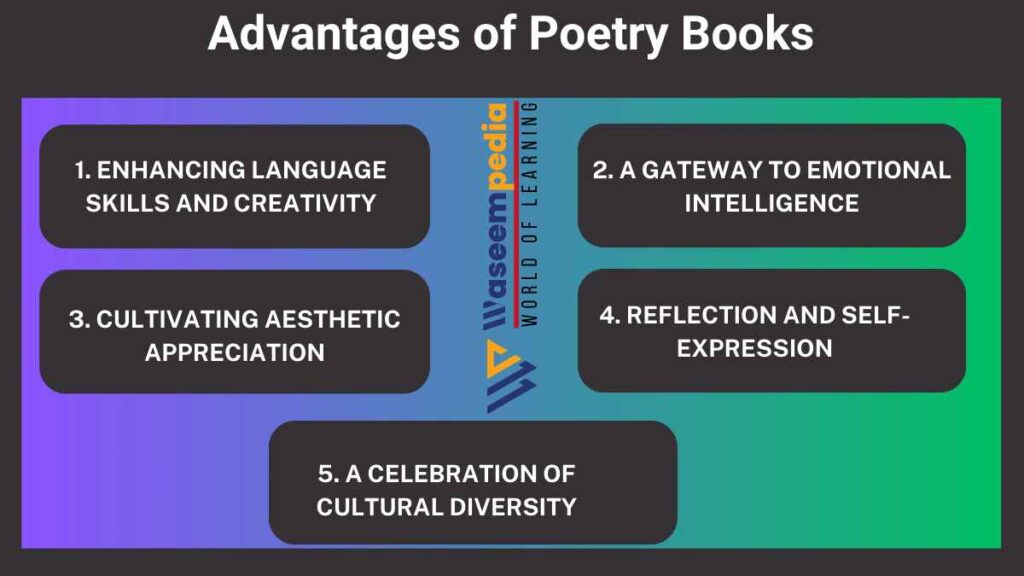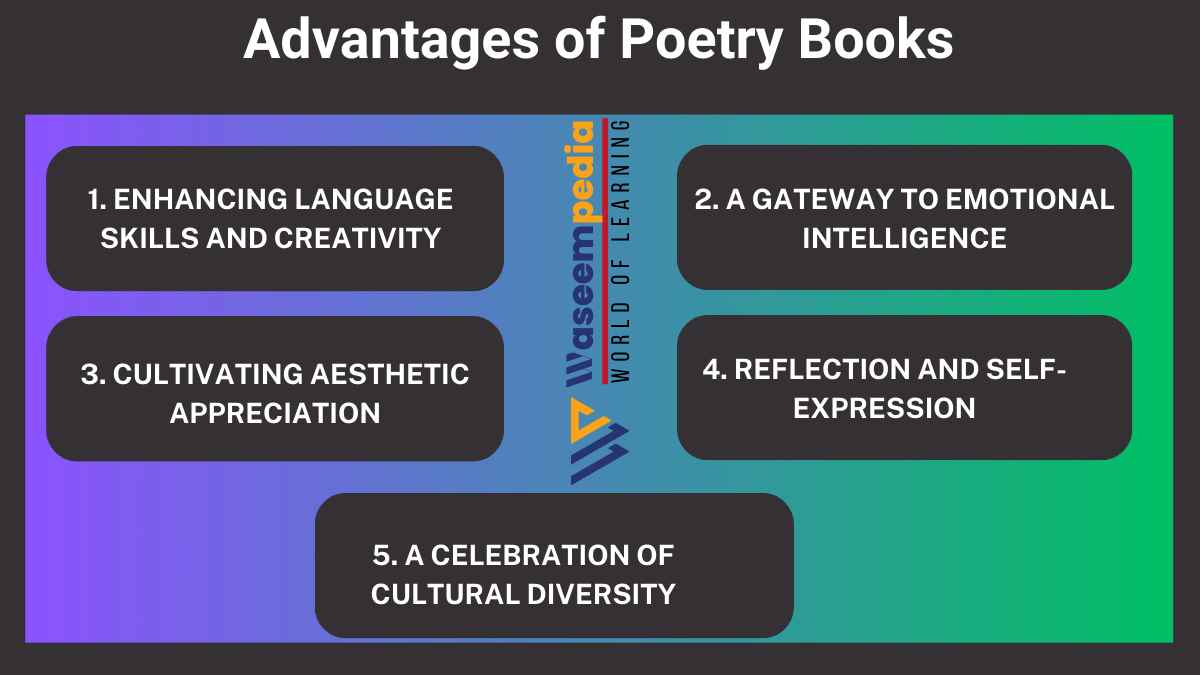Important Advantages of Poetry Books are emotional expression, creativity, language skills development, cultural exploration, personal growth, connection, catharsis, empathy, stress reduction, inspiration, and timeless wisdom.
Through the beauty of words, poetry books touch our souls, inviting us to explore the depths of human emotions and experience the world in new and profound ways. So, immerse yourself in the enchanting world of poetry and let the verses ignite your imagination and nourish your spirit.
Poetry has long been celebrated as a unique form of artistic expression. Its ability to evoke emotions, paint vivid imagery, and capture the essence of human experience is what makes poetry books truly special.
books having many advantages In this article, we will delve into the advantages and types of reading poetry books, highlighting the ways in which they enhance language skills, increase emotional intelligence, and deepen our appreciation for the beauty of words.
6 Advantages of Poetry Books
There are many Advantages of Poetry Books but here are discussed 6 Advantages of Poetry Books

1. Enhancing Language Skills and Creativity
One of the primary advantages of poetry books is their ability to enhance language skills. Poetry often employs unique literary devices such as rhyme, rhythm, and figurative language. By reading and analyzing poems, readers develop a heightened sense of language and an expanded vocabulary.
They learn to appreciate the nuances of word choice and the power of imagery. Furthermore, poetry encourages readers to think creatively, as they explore the multiple meanings and interpretations embedded within the verses.
2. A Gateway to Emotional Intelligence
One of the important Advantages of Poetry Books is emotional intelligence. Poetry books provide an intimate space to explore and understand human emotions. The vivid imagery, metaphors, and lyrical language of poetry evoke a wide range of feelings, allowing readers to connect with their own emotions and empathize with the experiences of others.
This emotional resonance enhances emotional intelligence, the ability to recognize and understand emotions in one and others. Through poetry, readers gain a deeper understanding of the complexities of human emotion, fostering empathy and compassion.
3. Cultivating Aesthetic Appreciation
Poetry is the art of crafting words into a symphony of sounds and images. Poetry books offer a vast array of poetic styles, ranging from traditional forms to contemporary free verse. By exploring different styles and reading the works of various poets, readers develop a refined sense of aesthetic appreciation.
They learn to appreciate the skillful use of language, the musicality of verses, and the careful arrangement of words. This heightened aesthetic sensitivity extends beyond poetry, enriching the way readers perceive and engage with other forms of art and beauty in the world.
4. Reflection and Self-Expression
Poetry books provide a platform for introspection and self-expression. They offer a space for readers to reflect on their own experiences, thoughts, and emotions. Poetry has a unique ability to distill complex feelings into concise and powerful verses.
By reading and even writing their own poetry, readers can explore their inner world, gain clarity, and find solace in the act of self-expression. Poetry becomes a means of capturing and preserving personal stories and emotions, fostering self-awareness and personal growth.
5. A Celebration of Cultural Diversity
Poetry books showcase the rich diversity of cultures and perspectives. Poets from different backgrounds and time periods share their unique voices, experiences, and cultural heritage through their verses. By reading poetry books, readers are exposed to different worldviews, traditions, and historical contexts.
This exposure cultivates an appreciation for cultural diversity and fosters a sense of interconnectedness among humanity. Poetry becomes a bridge that brings people together, transcending borders and fostering dialogue.
6. Promoting Mental Health and Well-being
Reading and writing poetry can have therapeutic benefits for mental health and well-being. Studies have shown that engaging with poetry can reduce stress, anxiety, and depression, while promoting relaxation and emotional healing. By expressing thoughts and emotions through poetry, individuals can gain a sense of catharsis and self-awareness, leading to improved mental and emotional resilience.
Types of Poetry Books
There are Many types of Poetry books but here are discussed 10 types that are as following
- Anthologies: Collections of poems curated around a theme, author, or time period.
- Single-Author Collections: Books featuring poetry written exclusively by one author.
- Chapbooks: Small, self-published booklets containing a limited selection of poems.
- Verse Novels: Novels written in poetic form, combining prose and poetry.
- Experimental Poetry: Books exploring unconventional forms, structures, and styles of poetry.
- Illustrated Poetry: Books featuring visual artwork alongside poetry.
- Spoken Word Collections: Books based on performances of spoken word poetry.
- Themed Collections: Books centered around specific topics, such as nature, love, or social issues.
- Translated Poetry: Books featuring poems translated from other languages into English.
- Classic Poetry Collections: Books containing poems by renowned poets from various literary periods.
Related FAQ’s
What are the benefits of poetry?
The benefits of poetry include emotional expression, creativity, language skills development, cultural exploration, personal growth, connection, catharsis, empathy, stress reduction, inspiration, and timeless wisdom.
Why are poetry books good?
Poetry books are good because they offer a platform for emotional expression, stimulate creativity, enhance language skills, provide cultural insights, foster personal growth, promote empathy, offer relaxation, inspire creativity, and share timeless wisdom.
What is the purpose of a poetry book?
The purpose of a poetry book is to provide a platform for poets to express their thoughts, emotions, and experiences through verse, as well as to offer readers opportunities for emotional connection, reflection, and artistic appreciation.
Why are poetry books good?
Poetry books are good because they offer a platform for emotional expression, stimulate creativity, enhance language skills, provide cultural insights, foster personal growth, promote empathy, offer relaxation, inspire creativity, and share timeless wisdom.

